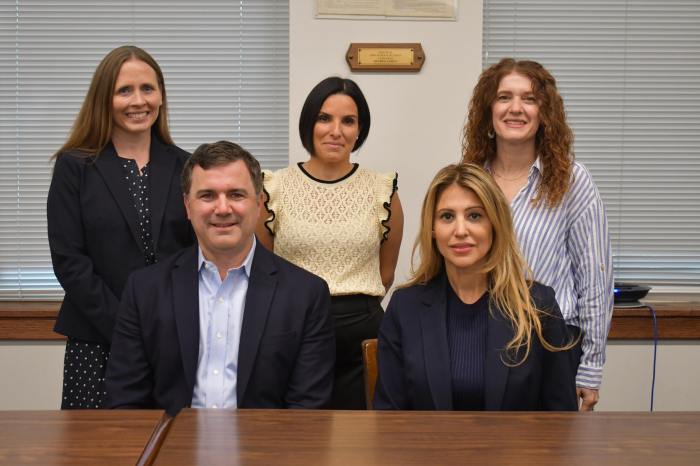 Governor Andrew Cuomo recently announced that the New York State Education Department has approved a bachelor’s degree program in Emergency Preparedness, Homeland Security and Cybersecurity at the University at Albany, State University of New York, for the start of the 2016-17 academic year. The announcement marks another key step forward for the College, the first program in the United States for this innovative area of academic focus.
Governor Andrew Cuomo recently announced that the New York State Education Department has approved a bachelor’s degree program in Emergency Preparedness, Homeland Security and Cybersecurity at the University at Albany, State University of New York, for the start of the 2016-17 academic year. The announcement marks another key step forward for the College, the first program in the United States for this innovative area of academic focus.
“The launch of the new college of Emergency Preparedness, Homeland Security, and Cybersecurity at SUNY Albany marks a major step forward in the state’s drive to train the next generation of leaders in these critical fields,” Governor Cuomo said. “This first-of-its-kind program will equip students with the cutting-edge security and preparedness capabilities they need to meet the challenges of the 21st century and work to enhance the security of New York and the nation for years to come.”
The College of Emergency Preparedness, Homeland Security and Cybersecurity at the University at Albany is the very first stand-alone college dedicated to the topics of emergency preparedness, homeland security and cybersecurity. The College has brought in leading scholars and professionals across sectors and disciplines to provide rich and wide-ranging academic offerings.
Additionally, to provide relevant real-world experiences to students, and to directly support existing efforts in these fields, CEHC is partnering with public agencies, private companies and non-profit organizations, including the Division of Homeland Security and Emergency Services, among others. These partnerships will provide research, internship and training opportunities to its students, including at the State Preparedness Training Center in Oriskany where students are applying high-level concepts learned in the classroom to complex simulated real-life threats.
The major in Emergency Preparedness, Homeland Security and Cybersecurity will provide the next generation of security and preparedness professionals with a comprehensive overview of emergency preparedness, homeland security and cybersecurity. The program provides a solid liberal arts foundation that emphasizes critical thinking, ethics, oral and written communication, creativity and innovation, problem solving skills, cultural literacy, leadership, and interpersonal and teamwork skills.
In addition, students will have the option to choose from a richly interdisciplinary list of courses, which include topics like public administration and policy, risk analysis, strategic communications, computer security, digital forensics, health preparedness, extreme weather, disaster response, terrorism, counterterrorism and much more. One of the unique and central elements of this major is the focus on experiential learning. Students will also complete 100 hours of non-credit training in Emergency Preparedness, Homeland Security and Cybersecurity.
“This new major in Emergency Preparedness, Homeland Security and Cybersecurity is a key component of U Albany’s academic expansion and supports Cuomo’s vision for New York to be a global leader in security and preparedness,” said U Albany President Robert J. Jones. “U Albany students can now earn a degree that prepares them for critical roles that protect our society against a growing array of risks and threats.”
Having the most prepared state in the nation takes having the most prepared students who are learning more than concepts and theories,” said Division of Homeland Security and Emergency Services Commissioner John Melville. “The Division is proud to partner with the University at Albany to engage students in real life experiences with public safety professionals who can share their knowledge and skills to help shape their academic careers and prepare them for the future.”
“We are delighted that we can now open the major to our students on campus and recruit outstanding high school seniors and transfer students to this unique and innovative program,” said CEHC Interim Dean David Rousseau. “One of the central elements of the program is our desire for students to take what they learn in the classroom and apply it in a real world setting. All of our majors will be required to complete a small research seminar, an internship, a senior capstone project with an external client, and training with public, private and nonprofit partners. We believe the combination of theory and practice will allow our students to identify careers and enter the workforce ready to contribute.”
The College of Emergency Preparedness, Homeland Security and Cybersecurity was established in May 2015, and is expected to grow over the next five years as it continues to establish both undergraduate and graduate academic programs.
In May, the governor announced that the first seven graduates received the first-of-its-kind undergraduate minor in Emergency Preparedness, Homeland Security and Cybersecurity. The minor was launched ahead of schedule in May 2015 and just one year later, the six-course minor had an enrollment of over 275 students, exceeding enrollment targets and making it the 7th most popular minor at the University (of 63 minors at the University), surpassed only by business, psychology, sociology, criminal justice, communications and English.
Earlier this year, Governor Cuomo announced that the University at Albany will redevelop 12 acres in the southwest corner of the Harriman Campus to construct a new Emerging Technology and Entrepreneurship Complex which will house CEHC, as well as headquarters for the New York State Mesonet, a state-of-the-art weather observation system developed to support better planning for extreme and dangerous weather events.
Visit www.albany.edu/cehc for more information.


































